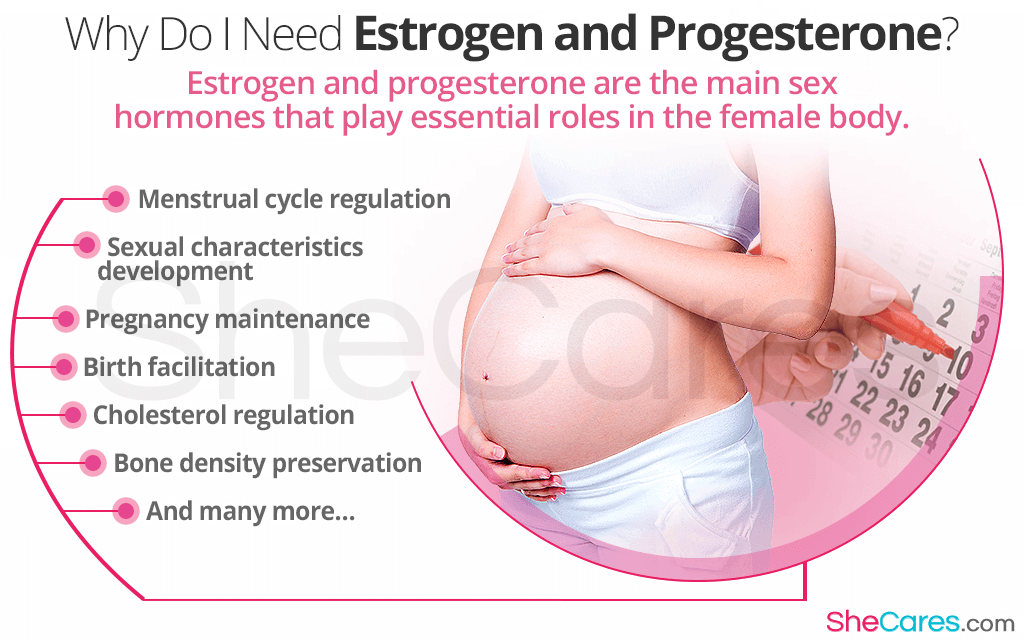Most women take their hormones, like estrogen and progesterone, for granted and only start paying attention when faced with an imbalance due to pregnancy, menopause, or premenstrual syndrome (PMS). Nevertheless, because the effects of imbalanced hormones can be detrimental, it is worth taking a moment to understand why estrogen and progesterone are needed.
Continue reading to find out why do women need estrogen and progesterone, including what roles do these hormones play in the female body and what happens if they are out of whack.
Why Do Women Need Estrogen?
Estrogen is a sex hormone whose main role is to make reproduction possible.
However, it also has other key non-reproductive functions. As such, women need estrogen for the following reasons:1,2
- It co-regulates the menstrual cycle, which is the body's way of preparing for pregnancy.
- It aids in the development of sexual characteristics, like breasts or pubic hair.
- It controls vaginal environment to prevent infections and aid the sperm's passage to the egg.
- It matures eggs stored in the ovaries in preparation for the release on ovulation.
- During pregnancy, it helps with breast growth, vascularization, and fetal development.
- It stimulates the uterine muscles contractions during birth to aid baby's passage through the canal.
- It aids cholesterol regulation, thus contributing to cardiovascular health.
- It helps preserve bone density and prevent bone loss.
- It maintains skin's thickness and collagen content.
- It contributes to mood control, cognition maintenance, and memory loss delay.
However, it is important to mention that estrogen only performs appropriately when it works in harmony with the other hormones in your body, such as progesterone, which is discussed below.
Why Do Women Need Progesterone?
Progesterone, even to a larger degree than estrogen, is a sex hormone whose main functions are related to enabling and maintaining pregnancy.
Consequently, women need progesterone for the following reasons:3,4
- It co-regulates the menstrual cycle, particularly during the second half, called the luteal phase.
- It thickens the endometrium (uterine lining) to prepare the body for possible pregnancy.
- It inhibits the uterine muscles from rejecting the fertilized egg, thus enabling it to implant.
- Its high levels during pregnancy stop the body from ovulating.
- It maintains the endometrial thickness to house and nourish the growing baby.
- milk productionIt prepares the breast for , while inhibiting lactation until after birth.
- It helps regulate blood pressure, improve cognition, and strengthen the bones, among other roles.
What Happens if Estrogen and Progesterone are Imbalanced?
It is important to remember that some hormonal fluctuations are normal and expected throughout a woman's life stages, including monthly menses, pregnancy, or menopause.
These natural shifts can trigger a number of stage-specific symptoms, like mood swings, breast tenderness, hot flashes, cramps, or bloating.
While most of these discomforts are either short-lived or can be handled with relative ease, consistently low or high estrogen and progesterone levels increase the risk of serious health complications.
Hormonally imbalanced women of childbearing age might struggle with ovulation problems and infertility, whereas those stricken with menopause symptoms might be at risk of incontinence, vaginal dryness or atrophy, stroke, or osteoporosis, necessitating more tailored treatment approaches.
Conclusions
Clearly, estrogen and progesterone, as part of the complex and interdependent endocrine system, play crucial roles in the female body. They, essentially, define what it means to be a woman. However, it is estimated that up to 80% of women suffer from hormonal imbalance.5 To counteract its negative effects, care should be taken to maintain hormonal homeostasis across all life phases, which can be achieved with a wide array of hormonal imbalance treatments, ranging from safe and effective lifestyle practices and alternative medicine to more risky pharmacological treatments. A little effort now will pay off in optimal health and happiness in the long run.
Sources
- American Heart Association. (2001). Vascular Effects of Progesterone. Retrieved November 11, 2019 from https://www.ahajournals.org/doi/full/10.1161/01.hyp.37.1.142
- Health Direct. (2017). Oestrogen. Retrieved November 11, 2019 from https://www.healthdirect.gov.au/oestrogen
- Hormone Health Network. (n.d.). What does estrogen do? Retrieved November 11, 2019 from https://www.hormone.org/-/media/hormone/files/infographics/infographic_estrogen_webvertical.pdf?la=en
- University of Rochester Medical Center. (n.d.). Estrogen's Effects on the Female Body. Retrieved November 11, 2019 from https://www.urmc.rochester.edu/encyclopedia/content.aspx?ContentTypeID=85&ContentID=P00559
- Hormone Health Network. (2019). Progesterone and Progestins. Retrieved November 11, 2019 from https://www.hormone.org/your-health-and-hormones/glands-and-hormones-a-to-z/hormones/progesterone
- Women in Balance Institute: National University of Natural Medicine. (n.d.). Progesterone & Cardiovascular Health. Retrieved November 11, 2019 from https://womeninbalance.org/resources-research/progesterone-cardiovascular-health
- Weill Cornell Medicine. (2001). Progesterone: Not Just a Sex Hormone, but a Blood Pressure Hormone, Too. Retrieved November 11, 2019 from https://news.weill.cornell.edu/news/2001/03/progesterone-not-just-a-sex-hormone-but-a-blood-pressure-hormone-too
Footnotes:
- EurekAlert. (2012). The influence of estrogen on female mood changes. Retrieved November 11, 2019 from https://www.eurekalert.org/pub_releases/2012-01/sicp-tio010912.php
- The Journal of Clinical Endocrinology & Metabolism. (2014). What Does Estrogen Do? Retrieved November 11, 2019 from https://academic.oup.com/jcem/article/99/4/31A/2537122
- Society for Endocrinology. (2018). Progesterone. Retrieved November 11, 2019 from https://www.yourhormones.info/hormones/progesterone/
- Women in Balance Institute: National University of Natural Medicine. (n.d.). Progesterone and the Nervous System/Brain. Retrieved November 11, 2019 from https://womeninbalance.org/resources-research/progesterone-and-the-nervous-systembrain
- Northwell Health. (2018). 11 unexpected signs of hormonal imbalance. Retrieved November 11, 2019 from https://www.northwell.edu/obstetrics-and-gynecology/fertility/expert-insights/11-unexpected-signs-of-hormonal-imbalance



